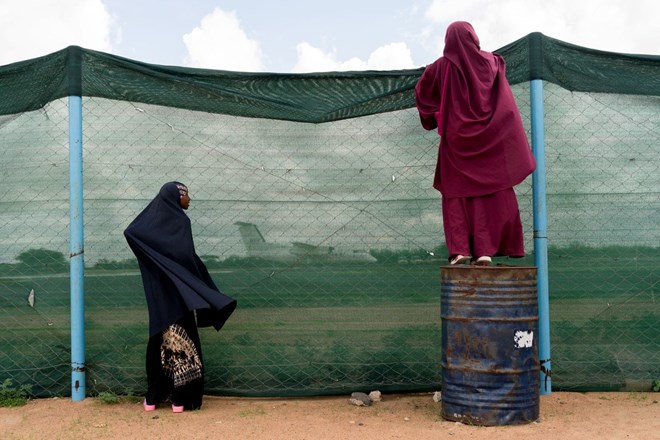
By Abdullahi Mire and Max Bearak
Saturday March 9, 2019

Girls watch as a plane lands in Dadaab, Kenya, on Nov. 6, 2017. (Adriane Ohanesian for The Washington Post)
DADAAB, Kenya — Over Somalia’s three decades of nearly nonstop conflict, more than a million refugees have made their way into neighboring Kenya. For four years as a child, Rep. Ilhan Omar (D-Minn.) was one of them.
For a long time, Dadaab — populated mostly by Somalis — was the largest refugee camp in the world. Today it is smaller but still home to a quarter of a million people. On International Women’s Day on Friday, for some of Dadaab’s young women, Omar is on their minds.
Her journey and achievement is a powerful antidote to the despair of the camp, especially in the era of the Trump administration’s so-called refugee ban, which makes the resettlement Omar’s family benefited from seem so distant for people here. Distant, too, is the controversy that has swirled around Omar in recent weeks, in which she has been reprimanded by those within and outside her party for remarks perceived to be anti-Semitic.
“In this part of the world we love her,” said Nyamouch Hoth, a 21-year-old South Sudanese woman. Hoth sat in an empty classroom with a friend, seeking shade from the 100-plus degree heat. On a piece of white printer paper, she sketched a portrait of Omar.
Hoth has spent the last four years in Dadaab and is one of the small number of non-Somalis there. Her uncle once sponsored her to go to an art school in Kenya, but he was killed in South Sudan’s civil war, and her money dried up. Her mother had decided to flee South Sudan, and the two of them landed in Dadaab.
“I would like to meet Ilhan in person one day,” said Hoth’s friend, Amina Yussuf. “She is my role model.”
Yussuf dreams about following Omar’s path but knows it’s likely out of reach for now, given the tightening restrictions on resettlement in the United States these days. She doesn’t want to go back to Somalia, even though the U.N. is offering money for those who voluntarily return. She believes her family will force her to marry someone against her will. In Dadaab at least, she can attend school and hang out with friends. Behind the walls of a nongovernmental organization’s compound, Yussuf and her friends sometimes get to play basketball.
Life in the camp is monotonous though, and making ends meet has become tougher in recent years. Drops in aid funding have led to increased food prices, and Kenyan authorities periodically threaten to shut down the entire camp, making for a precarious existence. Since militants from the Somali Islamist group al-Shabab attacked a hotel in Kenya’s capital, Nairobi, in January, rumors of a crackdown have put everyone on edge.
Under the Trump administration, the U.S. military has increased its unmanned drone strikes in Somalia threefold. Hundreds of militants have been killed. Human rights groups say civilians are also being killed, though it is hard to find out how many because so much of Somalia is inaccessible amid the fighting. The capital, Mogadishu, is attacked on a near-daily basis by al-Shabab.
"Here, we eat once a day since food rations were reduced. If you are lucky, you might have two meals,” said Saadia Matan, a senior in high school in Dadaab. Her class has 86 students. Her favorite subject is biology, but there’s only one book for everyone to share.
Outside the school, Halima Farah, 56, slowly takes a bundle of firewood off the top of her head and places it on the ground, resting for a second. She has six children, all born over the 27 years she has lived in Dadaab. In all those years, she has never left the camp and doesn’t see it happening any time soon.
“I think Donald Trump hates us the same way he hates Ilhan,” she said.
Moving back to Somalia is out of the question for her — “it’s a suicide mission” — and if Dadaab is shut down, she said she’d seek out another refugee camp.
Amina Yussuf voiced the obvious: “This place is stifling.” Bullies at school were making it even worse. At least her friend Nyamouch was teaching her how to draw.
“I hope that Ilhan can talk to Mzee Trump on our behalf,” she said, using an honorific title used for older men.